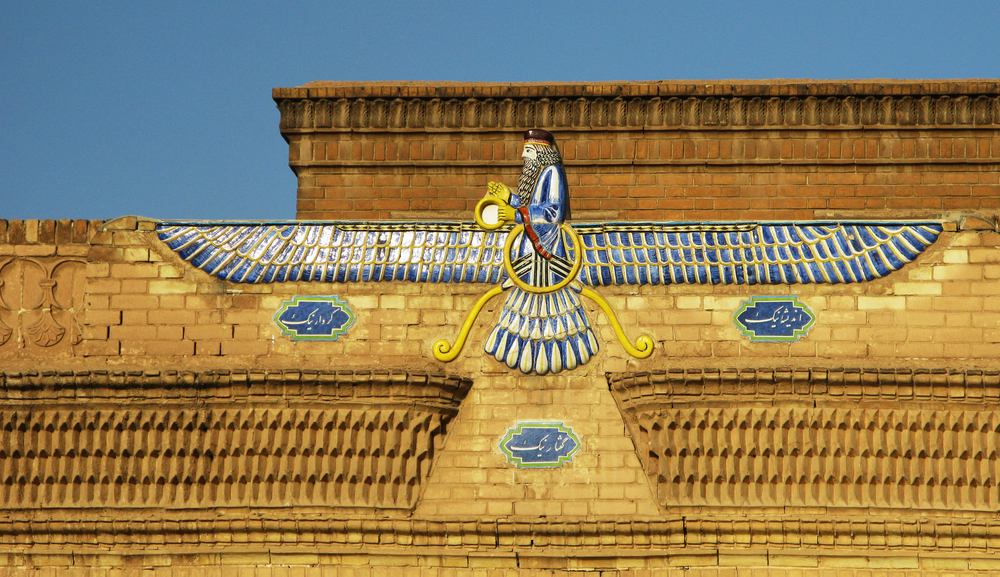
People generally associate monotheism with the three Abrahamic religions. The belief in one omnipotent deity is the focal point of Christianity, Islam, and Judaism. While such faiths hold disproportionate influence in the modern world, monotheistic faiths are relatively young compared to their polytheistic counterparts. For example, Hinduism predates the Jewish faith by nearly 5,000 years and features scores of gods and goddesses. While various polytheistic movements largely define early human history, there is an early monotheistic faith that is frequently overlooked. Emerging in Ancient Persia sometime around 1,500 BCE, Zoroastrianism is regarded as the world’s oldest monotheistic faith. Zoroastrianism is a likely ancestor of the Abrahamic tradition and still maintains adherents to this day.
Foundations of Zoroastrianism
Less commonly referred to as Mazdayasna, Zoroastrianism is an Iranian system of faith based on the teachings of a man known as Zarathustra. Much like Abraham, Muhammad, and Jesus Christ of Nazareth in their respective traditions, Zarathustra is regarded as the spiritual founder of the Zoroastrian faith. The name Zarathustra is the original spelling and pronunciation in the prophet’s native language of Old Avestan. Today, he is typically referred to by the Greek translation of his name, Zoroaster.
Prior to his teachings, Iranian civilization was guided by various polytheistic religions. While scholars do not agree on the details of his early life, Zarathustra is credited with uniting much of Persia under one belief system.
Beliefs and Theology
Much of the Zoroastrian belief system is centered around monotheism and dualistic cosmology. In short, Zoroastrianism teaches that there is one supreme God and that the universe is governed by the opposing forces of good and evil.
The holy book of Zoroastrianism is known as Avesta. This text teaches that Ahura Mazda is the omnipotent creator of the Universe. Often called The Lord of Wisdom, Ahura Mazda embodies what Zoroastrians call Spenta Maiyu. This term translates to “Bountiful Spirit” in English and represents the ultimate force of good. In contrast, Zoroastrians are called to be wary of Angra Mainyu, the Destructive Spirit. The moral code of the Zoroastrian faith can be summed up in the simple saying, “good words, good thoughts, and good deeds.”
When analyzing the ontology and cosmology of the Zoroastrian faith, one may notice strong similarities to the more well-known Abrahamic religions. The timeline of its emergence coupled with its geographical birthplace leads some scholars to believe that it was an early influence on the Jewish, Muslim, and Christian faiths. Some believe that Zoroastrianism even influenced elements of Buddhism and Greek philosophy.
Zoroastrianism Today
Zoroastrianism had a profound influence on the Ancient Iranian Empire. In fact, it was the official religion of the empire for over 2,000 years. In the early days of the seventh century, its influence began to decline as a result of the Islamic conquest of Persia beginning in 633 CE. Despite this, Zoroastrianism maintains adherents in communities across the world.
Current estimates place the number of Zoroastrians at around 100,000. While the United States enjoys the world’s third largest population of Zoroastrians, most adherents are still concentrated in modern-day Iran and parts of India.
Today’s adherents of Zoroastrianism maintain their faith through a combination of written and oral traditions. Within these communities, ancient practices ranging from prayer, traditional dress, and holy festivals still abound.
Zoroastrianism has a rich history that has impacted the development of both religion and human civilization. While each spiritual journey is unique and personal, appreciating the ancient roots of Zoroastrianism can broaden one’s perspective. Looking to early faiths like Zoroastrianism for perspective and inspiration provides deeper insight into the human experience, and opens the door to a better world.

